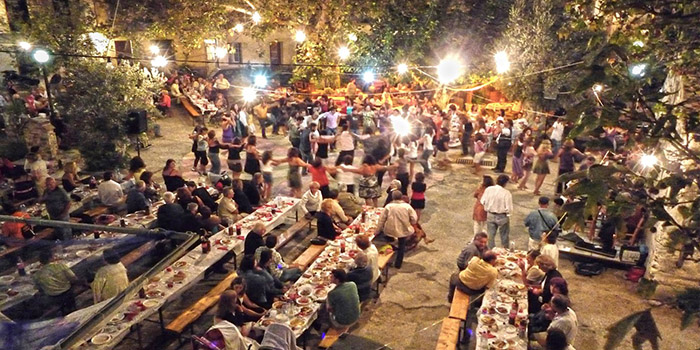Crete, the largest of the Greek islands, is renowned for its rich history, stunning landscapes, and vibrant culture. Central to this culture are the numerous community celebrations that punctuate the Cretan calendar, each reflecting the island’s deep-rooted traditions, religious fervor, and communal spirit. These celebrations are not merely events; they are integral to the social fabric of Crete, bringing together families, friends, and neighbors in a joyful expression of identity and heritage.
Religious Festivals and Saints’ Days
Religious festivals and saints’ days hold a special place in Cretan culture, intertwining faith and community in vibrant celebrations. These events often center around the local church, where elaborate ceremonies and rituals are conducted.
Easter: The Heart of Cretan Religious Life
Easter, or Pascha, is the most significant religious festival in Crete, marked by a series of deeply symbolic rituals and communal activities.
- Holy Week: The week leading up to Easter is filled with somber yet profound ceremonies. On Good Friday, communities gather for the Epitaphios procession, where a flower-adorned bier representing the body of Christ is carried through the streets.
- Resurrection Night: On Holy Saturday, at midnight, the Resurrection of Christ is celebrated with fireworks, the lighting of candles, and the joyous proclamation, “Christos Anesti!” (Christ is Risen!). This is followed by a festive meal, breaking the Lenten fast with traditional dishes such as lamb soup (magiritsa).
- Easter Sunday: The culmination of the Easter celebrations is marked by a feast featuring spit-roasted lamb, local cheeses, and an abundance of wine and raki. Families and friends gather to celebrate, often singing and dancing late into the night.
Saints’ Feast Days: Honoring Patron Saints
Every village in Crete has its own patron saint, and the feast day of this saint is a major event. These celebrations typically include a church service, processions, and a communal feast.
- The Feast of Saint Titus: In Heraklion, the feast day of Saint Titus, the island’s patron saint, is a significant event. It includes a grand procession through the city and various cultural activities.
- Panigiria: These are large, open-air festivals that take place on saints’ feast days. They involve traditional music, dancing, and feasting, often lasting well into the night. Villages like Anogeia and Zaros are known for their particularly vibrant panigiria.
Agricultural and Seasonal Festivals
Agriculture has always been the backbone of Cretan life, and many community celebrations revolve around the agricultural calendar. These festivals celebrate the island’s natural bounty and the hard work of its farmers.
The Olive Harvest Festival
The olive harvest, a crucial period in the Cretan agricultural calendar, is celebrated with various events that highlight the importance of olive oil in Cretan culture.
- Olive Picking: Villages like Vouves, home to one of the oldest olive trees in the world, host gatherings where locals and visitors participate in olive picking, followed by a feast featuring dishes prepared with freshly pressed olive oil.
- Tasting and Workshops: These festivals often include olive oil tastings, cooking demonstrations, and workshops on traditional methods of olive oil production.
The Grape Harvest and Wine Festivals
The grape harvest is another key agricultural event, celebrated with wine festivals that showcase Cretan viticulture.
- Vendemia: During the grape harvest, known as vendemia, communities come together to pick grapes and crush them in traditional wooden presses. This is often accompanied by music, dancing, and storytelling.
- Wine Tasting: Villages like Archanes and Sitia host wine festivals where local wineries showcase their products. Visitors can sample a variety of wines, including the famous sweet wine, Malvasia, and learn about the island’s winemaking traditions.
Cultural Festivals and Modern Celebrations
In addition to religious and agricultural festivals, Crete hosts a variety of cultural events that celebrate the island’s artistic and historical heritage.
Renaissance Festival of Rethymno
Held in the historic town of Rethymno, this festival celebrates the Renaissance period when Crete was under Venetian rule.
- Theater and Music: The festival features theatrical performances, classical music concerts, and dance shows, all set against the backdrop of Rethymno’s charming old town.
- Workshops and Exhibitions: Visitors can participate in workshops on Renaissance crafts, attend lectures on the period’s history, and view art exhibitions.
Kazantzakis Festival
Named after the famous Cretan author Nikos Kazantzakis, this festival in Heraklion celebrates literature and the arts.
- Literary Events: The festival includes readings, book signings, and discussions about Kazantzakis’s works and legacy.
- Cultural Performances: There are also performances of traditional Cretan music and dance, highlighting the island’s rich cultural heritage.
Communal Bonds and Cultural Preservation
Cretan community celebrations play a crucial role in preserving and promoting the island’s cultural heritage. They foster strong communal bonds, bringing together people of all ages to celebrate their shared traditions.
- Generational Continuity: These festivals provide a platform for passing down customs and practices to younger generations, ensuring that Cretan culture remains vibrant and alive.
- Tourism and Cultural Exchange: The festivals also attract visitors from around the world, providing opportunities for cultural exchange and showcasing the island’s unique heritage on a global stage.
Conclusion
Local community celebrations in Crete are a vibrant tapestry of tradition, faith, and joy. They reflect the island’s rich cultural heritage and its deep-rooted values of family, community, and connection to the land. Whether it’s the solemn rituals of Easter, the exuberant panigiria, or the agricultural festivals that celebrate the island’s natural bounty, these events offer a unique and immersive experience of Cretan life. Through these celebrations, the people of Crete continue to honor their past, celebrate their present, and look forward to their future, weaving a rich and enduring cultural legacy.


